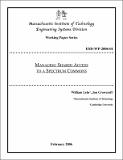Managing Shared Access to a Spectrum Commons
Author(s)
Lehr, William Herndon; Crowcroft, Jon
Downloadesd-wp-2006-01.pdf (428.2Kb)
Metadata
Show full item recordAbstract
The open access, unlicensed or spectrum commons approach to managing shared access to RF spectrum offers many attractive benefits, especially when implemented in conjunction with and as a complement to a regime of marketbased, flexible use, tradable licensed spectrum ([Benkler02], [Lehr04], [Werbach03]). However, as a number of critics have pointed out, implementing the unlicensed model poses difficult challenges that have not been well-addressed yet by commons advocates ([Benjam03], [Faulhab05], [Goodman04], [Hazlett01]). A successful spectrum commons will not be unregulated, but it also need not be command & control by another name. This paper seeks to address some of the implementation challenges associated with managing a spectrum commons. We focus on the minimal set of features that we believe a suitable management protocol, etiquette, or framework for a spectrum commons will need to incorporate. This includes: (1) No transmit only devices; (2) Power restrictions; (3) Common channel signaling; (4) Mechanism for handling congestion and allocating resources among users/uses in times of congestion; (5) Mechanism to support enforcement (e.g., established procedures to verify protocol is in conformance); (6) Mechanism to support reversibility of policy; and (7) Protection for privacy and security. We explain why each is necessary, examine their implications for current policy, and suggest ways in which they might be implemented. We present a framework that suggests a set of design principles for the protocols that will govern a successful commons management regime. Our design rules lead us to conclude that the appropriate Protocols for a Commons will need to be more liquid ([Reed05]) than in the past: (1) Marketbased instead of C&C; (2) Decentralized/distributed; and, (3) Adaptive and flexible (Anonymous, distributed, decentralized, and locally responsive).
Date issued
2006-02Publisher
Massachusetts Institute of Technology. Engineering Systems Division
Series/Report no.
ESD Working Papers;ESD-WP-2006-01